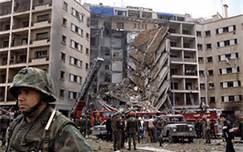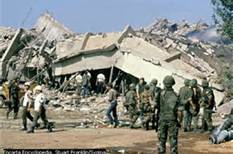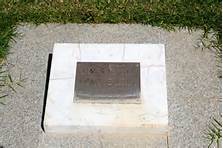 On April 18, 1983, fifty-two employees died when a terrorist drove an explosive-laden truck into the U.S. embassy in Beirut, Lebanon. These included Americans and Lebanese. Other innocent civilians were killed as they visited the embassy or walked by on a beautiful spring day. More than one-hundred employees were injured.
On April 18, 1983, fifty-two employees died when a terrorist drove an explosive-laden truck into the U.S. embassy in Beirut, Lebanon. These included Americans and Lebanese. Other innocent civilians were killed as they visited the embassy or walked by on a beautiful spring day. More than one-hundred employees were injured.
Seventeen months later, a van drove up at high speed to a new embassy annex in Beirut and detonated explosives. Twelve people were killed and 63 injured.
 Between those attacks, terrorists blew up a U.S. Marine Corps barracks near the Beirut airport, killing 221 Marines and other servicemen.
Between those attacks, terrorists blew up a U.S. Marine Corps barracks near the Beirut airport, killing 221 Marines and other servicemen.
Three of the dead in the first bombing had ties to the U.S. embassy in Tunis, Tunisia, where I was assigned for three years. Two were a couple who had studied at the Arabic language school in Tunis before their assignment to Beirut. One was a Tunisian employee of the embassy in Tunis on a temporary assignment to Beirut.
 Their names were carved on a small memorial at the Tunis embassy.When terrorists attacked that embassy last year, the memorial was vandalized. This year it was rededicated on the anniversary of the Beirut attack in which they died thirty years before. When I worked in Tunis, I passed it every day, a reminder of the sacrifice of ordinary people.
Their names were carved on a small memorial at the Tunis embassy.When terrorists attacked that embassy last year, the memorial was vandalized. This year it was rededicated on the anniversary of the Beirut attack in which they died thirty years before. When I worked in Tunis, I passed it every day, a reminder of the sacrifice of ordinary people.
Both embassies endure, still staffed by ordinary Americans, Lebanese, and Tunisians hoping for peace in the Middle East.

